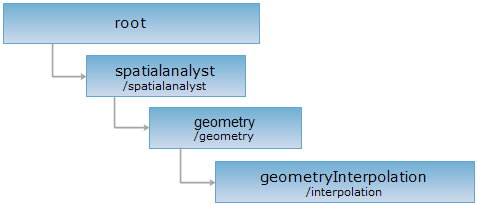URI
<geometry_uri>/interpolation[.<format>]
Supported methods
Parent resource
Child resources
geometryInterpolationDensity, geometryInterpolationIDW, geometryInterpolationRBF, geometryInterpolationKriging
Introduction
The root resource for performing interpolation analysis through Geometry. Interpolation analyses predicts values for surrounding areas of limited sample data to get the the overall distribution of the data in the research area, which makes the sample discrete points not only reflects the values of their own positions, but the numeric distribution of an entire region.
Currently, 4 interpolation methods are supported: Density, IDW, Kriging, RBF.
Supported Methods:
- GET: Gets the supported interpolation methods for interpolation with coordinates of discrete points.
- HEAD: Checks the existence of the geometryInterpolation resource, or whether the client has the permission to access the geometryInterpolation resource.
Supported output formats: rjson, json, jsonp, html, xml.
Resource hierarchy

HTTP request methods
Implement the HTTP request on the following URI, where supermapiserver is the server name, with rjson being the output format.
http://supermapiserver:8090/iserver/services/spatialanalyst-sample/restjsr/spatialanalyst/geometry/interpolation.rjson
GET request
Gets the supported interpolation methods for interpolation with coordinates of discrete points
Response structure
Returns interpolation method child resources.
| Field | Type | Description |
| name | string | Name of the child resource corresponding to the interpolation algorithm. |
| path | string | URI of the child resource corresponding to the interpolation algorithm. |
| resourceConfigID | string | The ID of the resource configuration file. |
| resourceType | ResourceType | The resource type. |
| supportedMediaTypes | string[] | The supported media types. |
Response example
The rjson format result returned through implementing the GET request on http://localhost:8090/iserver/services/spatialanalyst-sample/restjsr/spatialanalyst/geometry/interpolation.rjson would be as follows:
[
{
"name": "geometryInterpolationIDW",
"path": "http://localhost:8090/iserver/services/spatialanalyst-sample/restjsr/spatialanalyst/geometry/interpolation/idw",
"resourceConfigID": null,
"resourceType": null,
"supportedMediaTypes": null
},
{
"name": "geometryInterpolationDensity",
"path": "http://localhost:8090/iserver/services/spatialanalyst-sample/restjsr/spatialanalyst/geometry/interpolation/density",
"resourceConfigID": null,
"resourceType": null,
"supportedMediaTypes": null
},
{
"name": "geometryInterpolationRBF",
"path": "http://localhost:8090/iserver/services/spatialanalyst-sample/restjsr/spatialanalyst/geometry/interpolation/rbf",
"resourceConfigID": null,
"resourceType": null,
"supportedMediaTypes": null
},
{
"name": "geometryInterpolationKriging",
"path": "http://localhost:8090/iserver/services/spatialanalyst-sample/restjsr/spatialanalyst/geometry/interpolation/kriging",
"resourceConfigID": null,
"resourceType": null,
"supportedMediaTypes": null
}
]
HEAD request
Asks for the response identical to the one that would correspond to a GET request, but without the response body. This is useful for retrieving meta-information written in response headers, without having to transport the entire content. The meta-information includes the media-type, content-encoding, transfer-encoding, content-length, etc.
HEAD request can be used to check if the geometryInterpolation resource exists, or if the geometryInterpolation resource can be accessed by clients. It can also determine if the geometryInterpolation resource supports an output format <format> if performed on a URI with .<format> included.